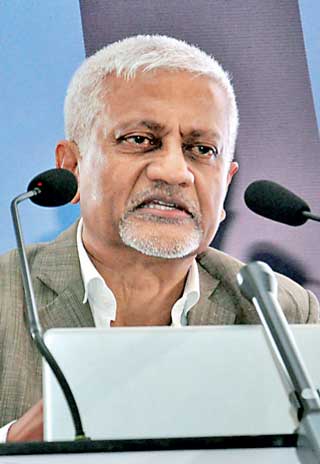Wednesday Feb 25, 2026
Wednesday Feb 25, 2026
Thursday, 8 June 2023 00:35 - - {{hitsCtrl.values.hits}}

From left: LIRNEasia Senior Research Manager Gayani Hurulle, Welfare Benefits Board Chairman B. Wijayaratne, Advocata Institute CEO Dhananath Fernando, CEPA Sustainable Development Team Leader Karin Fernando and LIRNEasia Statistician Tharaka Amarasinghe
 |
| LIRNEasia Founding Chairman Rohan Samarajiva |
LIRNEasia, a Colombo-based think tank yesterday revealed its study on Social Safety Nets and the state of Poverty in Sri Lanka found that only 40% out of the 1.7 million Samurdhi social welfare beneficiaries can be identified as poor.
According to the organisation, this is despite at least 7 million Sri Lankans now living in poverty with 4 million of them having fallen into poverty since 2019 following the Covid-19 pandemic and economic crisis. The research also found that poverty across all nine provinces has increased since 2019.
The study found that the coverage of social safety nets was low across all programs including the Samurdhi benefit.
LIRNEasia revealed that only 31% of the 10% of the poorest households receive Samurdhi cash transfers while 4% of the richest 10% of households also receive financial aid from the State.
The politicisation of social security nets was revealed through the study, while the organisation said officials appear to exercise a high level of discretion in providing benefits while the programs were also misused for political gain.
The organisation had gathered information from a sample of 10,000 households in 400 Grama Seva divisions through focus group discussions, interviews and structured observations.
Among its other findings, it was disclosed that Estate communities continue to be the worst off with at least 51% of them continuing to live in poverty.
The study also bolstered the recent findings of other organisations relating to food security. “Many households reduced their food consumption due to the economic crisis. 47% limited their portion sizes at meal times, 33% ate fewer meals a day, 27% restricted adult food consumption to allow children to eat,” the report said.
“Some sold their household assets and spent savings to meet their day-to-day needs,” it added. Shockingly LIRNEasia said it found that at least 50% spent their savings to purchase essentials.
The think tank has recommended the improvement of clarity on program operations and the implementation of a plan for revaluation and exit mechanisms. Other recommendations included the enabling of digital regulation options, integrating a unified social registry with other digitised bases for better beneficiary data verification, and providing access to credit and capacity-building programs for benefactors.